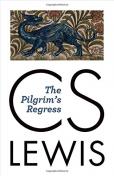BKMT READING GUIDES
The Pilgrim's Regress
by C. S. Lewis
Published: 2014-10-22
Paperback : 256 pages
Paperback : 256 pages
0 members reading this now
1 club reading this now
0 members have read this book
1 club reading this now
0 members have read this book
The first book written by C. S. Lewis after his conversion to Christianity, The Pilgrim's Regress is, in a sense, a record of Lewis's own search for meaning and spiritual satisfaction, a search that eventually led him to Christianity.
Here is the story of the pilgrim John and his odyssey ...
Here is the story of the pilgrim John and his odyssey ...
No other editions available.
Jump to
Introduction
The first book written by C. S. Lewis after his conversion to Christianity, The Pilgrim's Regress is, in a sense, a record of Lewis's own search for meaning and spiritual satisfaction, a search that eventually led him to Christianity.
Here is the story of the pilgrim John and his odyssey to an enchanting island that creates in him an intense longing -- a mysterious, sweet desire. John's pursuit of this desire takes him through adventures with such people as Mr. Enlightenment, Mr. Mammon, Mother Kirk, and Mr. Sensible and through such cities as Thrill and Eschropolis -- and through the Valley of Humiliation.
Though the dragons and giants here are different from those in Bunyan's Pilgrim's Progress, Lewis's allegory performs the same function of enabling the author to say with fantasy and simplicity what would otherwise have demanded a full-length philosophy of religion. In Lewis's skillful hands this fable becomes as effective a Christian apologia as Bunyan's.
Here is the story of the pilgrim John and his odyssey to an enchanting island that creates in him an intense longing -- a mysterious, sweet desire. John's pursuit of this desire takes him through adventures with such people as Mr. Enlightenment, Mr. Mammon, Mother Kirk, and Mr. Sensible and through such cities as Thrill and Eschropolis -- and through the Valley of Humiliation.
Though the dragons and giants here are different from those in Bunyan's Pilgrim's Progress, Lewis's allegory performs the same function of enabling the author to say with fantasy and simplicity what would otherwise have demanded a full-length philosophy of religion. In Lewis's skillful hands this fable becomes as effective a Christian apologia as Bunyan's.
Discussion Questions
No discussion questions at this time.Book Club Recommendations
Recommended to book clubs by 0 of 0 members.
MEMBER LOGIN
BECOME A MEMBER it's free
Book Club HQ to over 90,000+ book clubs and ready to welcome yours.
SEARCH OUR READING GUIDES
Search
FEATURED EVENTS
PAST AUTHOR CHATS
JOIN OUR MAILING LIST
Get free weekly updates on top club picks, book giveaways, author events and more
Get free weekly updates on top club picks, book giveaways, author events and more
Please wait...








